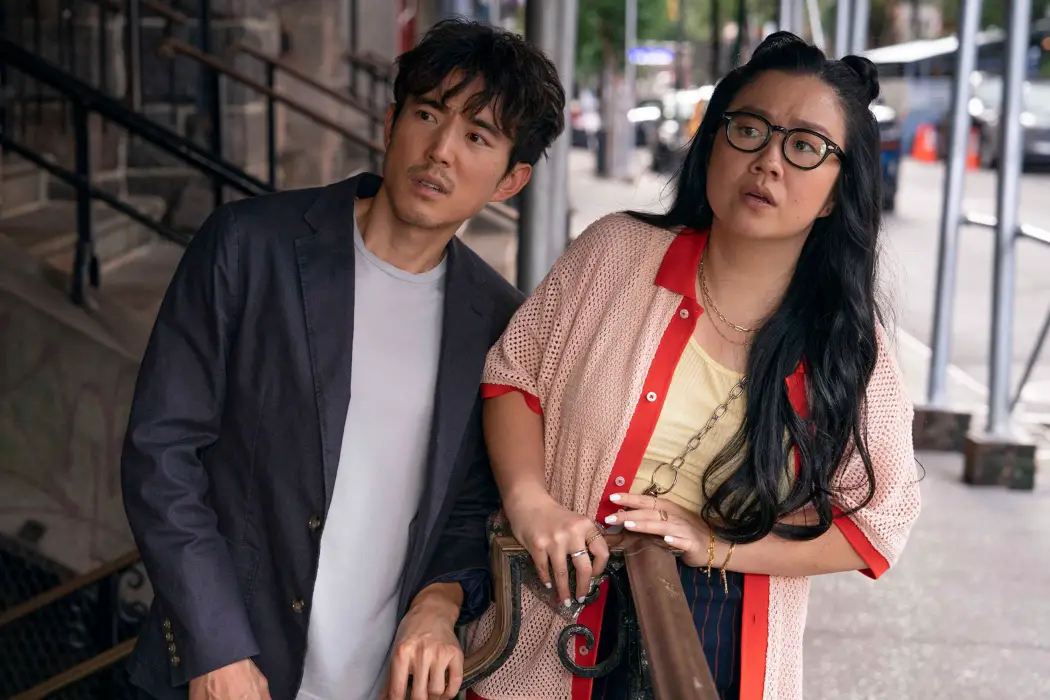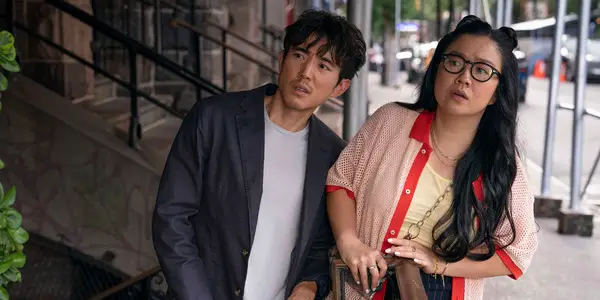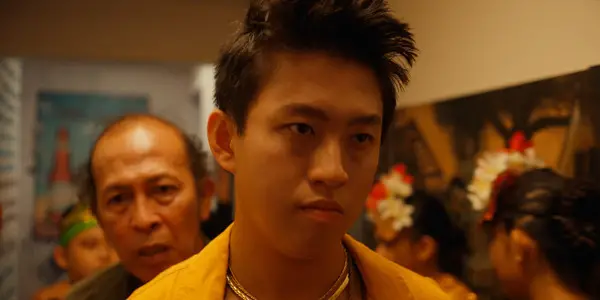Sundance Film Festival 2023: SHORTCOMINGS & JAMOJAYA

Wilson is a cinema enthusiast based out of Toronto, Canada.…
Asian American filmmakers have certainly been getting more opportunities as of late, and the following two films are reflective of that. Randall Park makes his feature directorial debut in Shortcomings, which is an off-kilter romantic comedy that tries exploring cultural nuances in the process. On the other hand, Sundance veteran Justin Chon dives into a narrative that sees his own Indonesian culture clash with American values in Jamojaya. There’s ample room for improvement in the latter, but both films are fine examples of increased representation in the American film industry.
Shortcomings (Randall Park)

This is a refreshing take on the romantic comedy genre that tries to elevate its commentary on the nuances of Asian American culture. Randall Park does a fine job in his feature directorial debut and crafts a film that’s well-intentioned and provides interesting food for thought. Unfortunately, the film falters in its decision to have a protagonist who is frustratingly unredeemable, even if he’s meant to be misunderstood. Shortcomings follows the wayward life of Ben (Justin H. Min), a struggling filmmaker working as a local theatre manager whose relationship with his partner, Miko (Ally Maki), is clearly on the rocks. His best friend Alice (Sherry Cola) tries to offer support, while going through issues of her own.
Park’s intuition for comedy is an obvious asset here, and Shortcomings is expectedly playful and entertaining. An appearance by his fellow Marvel alumni, Jacob Batalon, is particularly charming and much of the film’s supporting cast adds just the right amount of brevity to the story. The film moves with a well-adjusted pace, covering lots of kinetic and emotional ground in the process.
Adrian Tomine also does a commendable job adapting his own graphic novel, but the characterization of Ben is unfortunately a bit problematic. And it’s not that having a flawed protagonist is an issue, but for a film that jousts as an atypical romantic comedy of sorts, there does have to be some redeeming quality that audiences can hang onto. These redeeming qualities are usually what sparks excitement during a character’s eventual proclamation or realization of identity, which falls short (pardon the pun) in this particularly film. With Ben, his stubbornness and inability for competent self-reflection only becomes increasingly overbearing as the film progresses. Min does a tremendous job with what he’s asked to do, but the ask feels like a losing battle.
Shortcomings should be lauded for its attempt at pushing the discourse on Asian American representation. The film even makes a statement on the unrealistic depiction of wealthy Asians in commercial filmmaking, but adds nuance to the topic by contrasting these successes with Ben’s commitment the arthouse cinema, but lack of success in those endeavours. Discussions around mixed-race relationships and specific dynamics arising from these relationships are also interesting, and certainly adds to the more typical discourse we’re used to seeing. Films made by and about Asian Americans are thankfully increasing in numbers, and Shortcomings is a promising example of narratives that continue to explore new facets of this culture. While flawed by its troubling protagonist, the film is still quite enjoyable and Park shows great promise as a director.
Jamojaya (Justin Chon)

Justin Chon’s latest is an artistically inclined meditation on cultural and paternal bonds, which seems like a well-intentioned exercise in personal artistic expression. It’s clear that this is a very personal film for Chon, but despite channeling his arthouse sensibilities with seemingly no reservations, Jamojaya is unfortunately a disjointed exercise in filmmaking that fails to deliver. The film follows James (Brian Imanuel), a young Indonesian rapper prodigy who sets his mind on expanding into the U.S. market. His father (Yayu A.W. Unru) is forced to step down as his long-time manager, but has difficulties fully letting go. What results is a collision of culture and artistic intentions between James and his new record label, triggering even more conflict.
There’s a slew of interesting ideas in Jamojaya and the film is probably meant to be alienating, but its lack of narrative cohesion makes it difficult to fully connect with the story. While the father character is meant to be misunderstood, tying into the film’s commentary on cultural misinterpretation, his intentions are overtly confusing and seemingly lack any meaningful direction. He obviously cares for his son and displaces some of his grief of losing another son on this remaining relationship, but the film takes a muddled approach in exploring this. There’s a scene where the father-son duo have a shared experience at a strip club, which is perhaps meant to symbolize their inability of connecting through normalized conditions. But rather than create a sense of atypical bonding, choices like these are confounding, when they really should (and need to) be thought-provoking.
Imanuel, who’s stage name as a rapper in real life is Rich Brian, is quite impressive for his first outing as an actor. And as frustrating as his character might be, Unru is clearly a capable actor who helps carry much of the film’s emotionally taught moments. Chon also has a clear eye for creating a sombre ambiance that contrasts nicely with the hip-hop energy of the film’s performance scenes. The use of voiceover monologues are in some ways reminiscent of Wong Kar-Wai, but only marginally as they are quite brief and fails to carry any meaningful impact.
Jamojaya also delves into how cultural divide can impact one’s relationship with art, which can then underscore their relationship with those around them. The exact cultural nuances aren’t necessarily important, but the general idea of being indifferent to alternative ways of life is explored somewhat thoughtfully. Chon does this mainly through an allegory of a prince dying and being transformed into a tree, with his brother being a bird who flies aimlessly looking for said tree. The father repeats this story on loop, and the idea of eternally searching for something that might be clearly in sight is almost reflective of Jamojaya’s own identity as a film. There’s plenty of thoughtful ideas embedded into the film, but Chon takes more of an aimless gaze into a story that really needed more cohesion and tact. Perhaps this was intentional, but such intentions are sadly misaligned.
Does content like this matter to you?
Become a Member and support film journalism. Unlock access to all of Film Inquiry`s great articles. Join a community of like-minded readers who are passionate about cinema - get access to our private members Network, give back to independent filmmakers, and more.
Wilson is a cinema enthusiast based out of Toronto, Canada. He escapes from his day job by writing random thoughts about cinema on the internet. Although he has a longstanding penchant for Hong Kong cinema, he considers himself to be an advocate for Asian cinema in general. He has been attending the Toronto International Film Festival every year since 2005, and more of his work can be found on his website: www.wilson-kwong.com.













